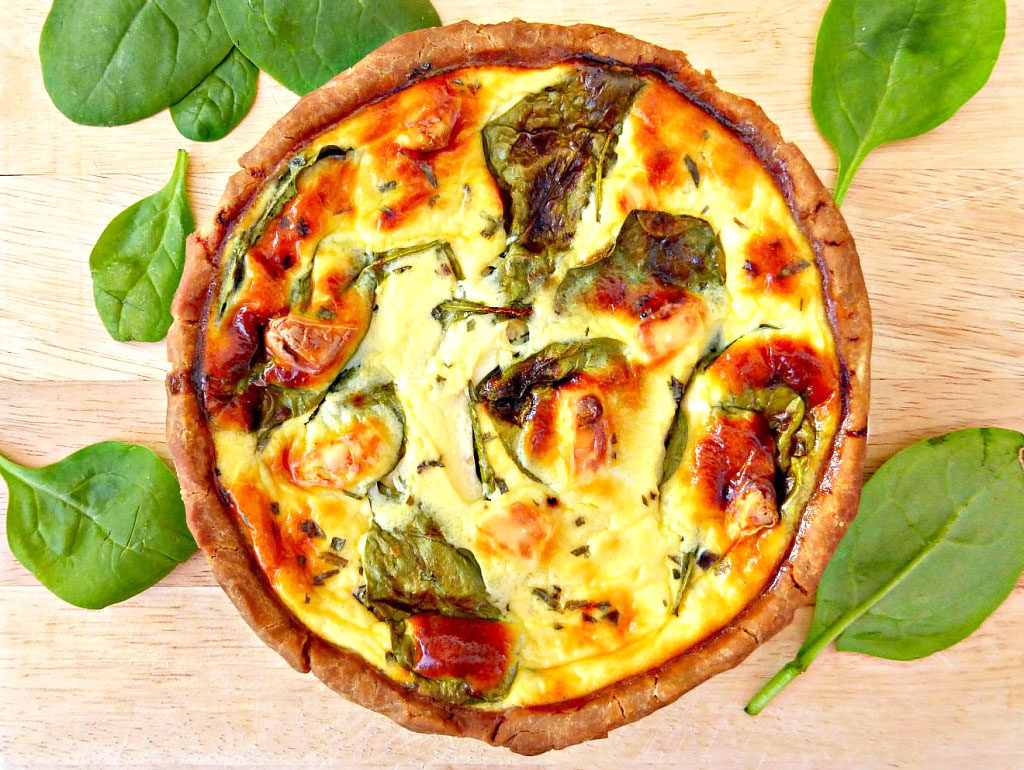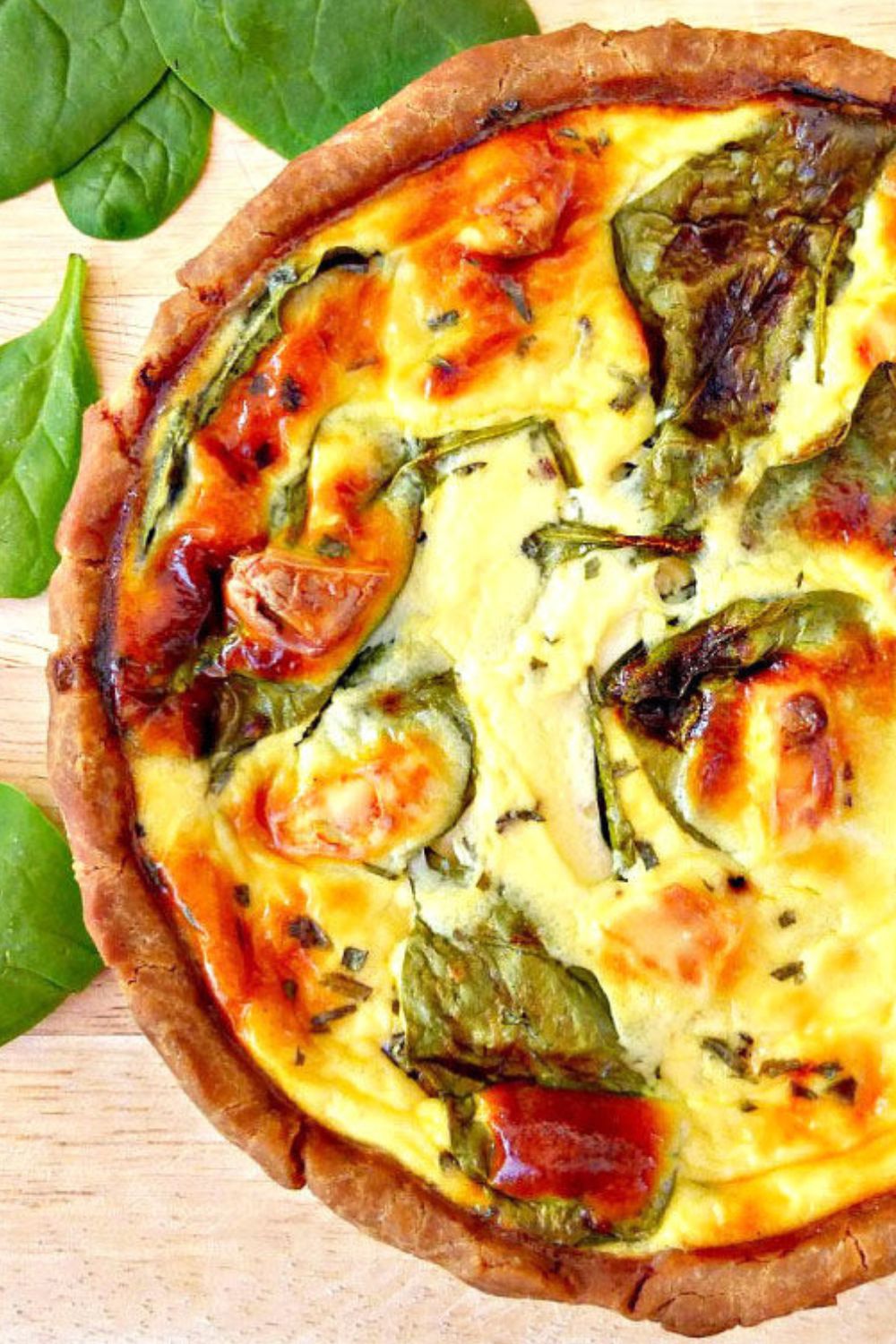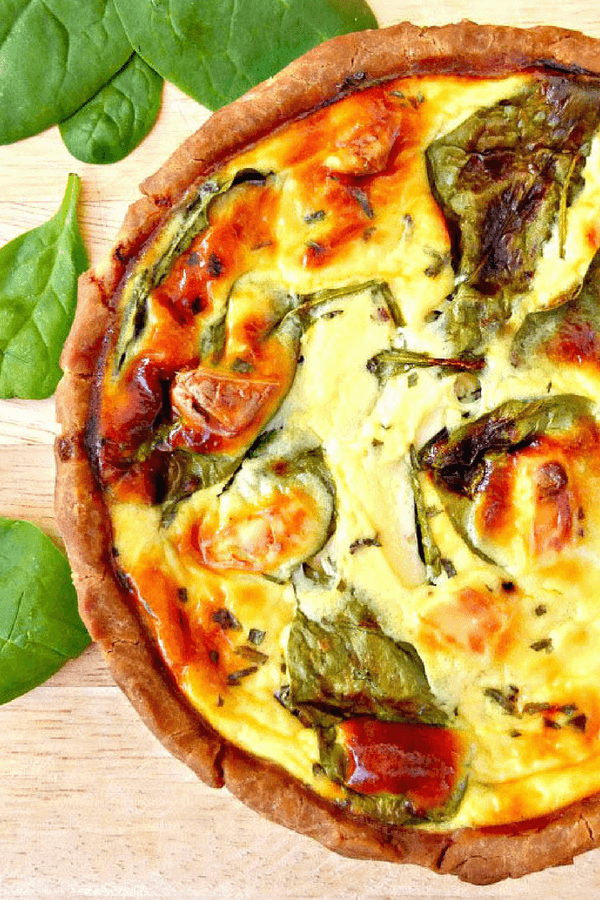Creamy Goat’s Cheese Pie with Gluten-Free Buckwheat Pastry
My gluten free sour cream and goat’s cheese pie is a deliciously creamy and tangy savoury pie that’s perfect for lunch, dinner, or even a picnic. Made with a tender buckwheat pastry crust and a filling of milk, lower-fat sour cream, eggs, and fresh spinach, this recipe balances lightness with indulgence. The star ingredient is goat’s cheese, which adds a beautiful sharpness that lifts the flavours and brings everything together.
This gluten free recipe is highly adaptable to suit your tastes and dietary needs.
Gluten free goat’s cheese pie: a recipe that stood the test of time
This savoury goat’s cheese pie was originally published on The Culinary Jumble back in September 2015. It was my very first attempt at gluten free pastry, and I remember being amazed by how beautifully it turned out. The images and recipe remain unchanged, but now that my focus is spelt flour, I wanted to update the recipe with alternatives to gluten free flour.
Whether you eat gluten free by necessity or choice, this little pie is full of flavour and creaminess without being too heavy. And if you’re just here for the cheese? Trust me, you’re in good hands.
Gluten free pastry crust
The crust is made with a mix of buckwheat, starch, and rice flour, making it naturally gluten free. Gluten free pastry can feel intimidating, but once you get the hang of it, it’s incredibly rewarding. This crust uses a trio of flours:
- Buckwheat flour: Despite its name, buckwheat is naturally gluten free. It has a rich, earthy flavour that pairs beautifully with goat’s cheese.
- Starch (corn, potato, or tapioca): This helps bind the dough and adds a little chewiness to the crumb.
- Rice flour: Brings lightness and prevents the dough from becoming too dense.
If you’re not confident mixing your own gluten free flour blend, there are some excellent ready-made options available in shops these days. You can substitute the total amount of flour in this recipe with a gluten free flour blend, but just keep in mind that results may vary slightly depending on the ingredients. Some blends already contain binders like xanthan gum, which can affect the texture.
For best results, look for a blend that’s specifically formulated for pastry or shortcrust baking, as these tend to give a better balance of tenderness and structure.
Can I use spelt flour instead?
Although this recipe was originally created to be gluten free, it works beautifully with spelt flour if gluten isn’t an issue for you. Spelt is an ancient grain related to wheat, with a mild, slightly nutty flavour. It’s often more digestible than standard wheat flour, making it a good alternative for many people.
To substitute spelt flour for my gluten free blend (which includes buckwheat, rice flour, and starch), use the same total amount of flour (100g). I recommend a mix of white and wholemeal spelt flour. For example, 50g white spelt and 50g wholemeal spelt for a good balance of flavour and texture.
What to adjust:
- You likely won’t need to add water to bring the dough together. Spelt flour absorbs liquid differently than gluten-free flours, so start by adding only the egg, and mix. Add water only if it feels dry.
- The dough will be less sticky and easier to handle than the original version, so rolling it out should be more straightforward.
- If you’re using only wholemeal spelt, the crust will be a little more rustic and hearty. Therefore, you might want to increase the butter slightly for tenderness.
This version won’t be gluten free, but it will still deliver a lovely flaky crust that pairs wonderfully with the goat’s cheese filling.
Goat’s cheese pie filling
The filling for this pie is beautifully simple but full of flavour. It’s made with just milk, lower-fat sour cream, and eggs. There’s no need for heavy cream. This combination gives the pie a light, custard-like texture that feels silky and rich without being too heavy. A touch of tarragon adds a subtle herbal note, while fresh spinach brings colour and a little earthiness.
But it’s the goat’s cheese that really pulls everything together. Made from goat’s milk, this cheese has been around for thousands of years. Long before refrigeration or industrial dairies. It’s still loved today for its soft, creamy texture and unique flavour: fresh goat’s cheese is tangy, slightly salty, and often described as having a lemony brightness with a faint earthy note. It cuts through the richness of the eggs and sour cream beautifully, bringing contrast and depth to the filling.
When baked, goat’s cheese melts gently but doesn’t fully disappear: Instead, it softens into little pockets of flavour that dot the pie with bursts of savoury sharpness. It’s a simple addition, but it elevates the dish from comforting to something really special.
Nutritionally, goat’s cheese tends to be lower in lactose and slightly higher in certain essential minerals like calcium, phosphorus, and selenium. Many people also find it easier to digest than cow’s milk cheese, although of course, this varies from person to person.
If you’d like to know more about its history, taste, and uses, take a look at this helpful guide: Understanding goat’s cheese.
Alternatives fillings for this gluten free pie
Goat’s cheese is the star of this dish, with its creamy texture and tangy bite. If it’s not your favourite, don’t be afraid to swap it out:
- Feta: A salty, crumbly option that works beautifully with spinach.
- Blue cheese: For a stronger flavour, goes especially well with walnuts or caramelised onions.
- Cream cheese or ricotta: Milder, creamier alternatives that can soften the flavour profile if serving children or goat’s cheese skeptics.
And if you’d like to play around with the rest of the filling, here are a few other ingredient swaps and additions that work well:
- Sour cream: Swap with crème fraîche or Greek yoghurt for a similar tangy richness.
- Milk: Any milk will do: whole milk gives a slightly richer result, while oat or almond milk can be used for a dairy-light version.
- Spinach: Kale, chard, or lightly sautéed leeks make lovely seasonal alternatives.
- Tarragon: Not everyone loves its subtle aniseed note. Feel free to use thyme, oregano, or basil instead.
The base is flexible enough to take on different flavour combinations. Just keep the same general ratio of eggs to dairy for the custard to set properly.
Want to make a bigger pie?
The original recipe makes a small 7-inch / 18cm pie, perfect for 2–3 people or a light lunch with salad. But it’s easy to scale up if you’d like to serve more.
To make a standard 9-inch / 23cm pie:
- Double the pastry and filling ingredients.
- You may need to add 5–10 minutes to the bake time to ensure the filling sets in the centre. Keep an eye on it towards the end and check with a knife or toothpick.
Tips for scaling:
- Roll the pastry slightly thinner if doubling, to help it stretch across the larger base and sides.
- If you’re short on pastry, press it in by hand and patch any gaps; it’s a forgiving dough.
Serving Suggestions and Storage
This goat’s cheese pie is delicious warm, at room temperature, or even cold the next day, which makes it ideal for everything from a cosy lunch to a picnic spread.
What to serve it with:
- Crisp green salad: A simple salad with peppery leaves like rocket or watercress works beautifully.
- Roasted vegetables: Think seasonal sides like roasted beetroot, carrots, or butternut squash.
- Soup: Serve alongside a bowl of tomato or vegetable soup for a comforting lunch or light dinner.
- Grain salad: Something like quinoa or bulgur with herbs and lemon adds texture and brightness.
- Picnic fare: Pack it with olives, sun-dried tomatoes, and fresh bread for an easy, elegant picnic option.
Storage:
- Fridge: Store any leftovers in the fridge, covered or in an airtight container, for up to 3 days.
- Freezer: The cooked pie can be frozen, though the texture of the filling may change slightly. Wrap tightly and freeze for up to 1 month. Defrost in the fridge overnight and reheat gently in the oven.
- Reheating: Warm slices in the oven at 160°C (320°F) for about 10–15 minutes. Microwaving works in a pinch, but you may lose some of the pastry’s texture.
This pie is just as tasty the next day, so don’t be afraid to make it ahead (or stash away a slice for later).
Gluten Free Goat's Cheese Pie
Ingredients
Pastry:
- 50g (1/3 cup + 1 tbsp) buckwheat flour (see note 1)
- 25g (3 tbsp) starch (corn, potato or tapioca)
- 25g (3 tbsp) rice flour
- ½ tsp salt
- 40g (3 tbsp) butter (cold and chopped into small pieces)
- 1 egg (medium)
Filling:
- 125ml (½ cup) sour cream (see note 2)
- 75g (¼ cup + 1 tbsp) milk
- 2 eggs (medium)
- ¼ tsp tarragon
- sea salt and pepper (to taste)
- 30g (1 oz) goat cheese
- handful of spinach
Instructions
- Lightly grease a small pie dish (mine was a round 7" / 18cm springform pan).
- Mix the flours, salt, and starch in a large bowl. Add the butter and rub it into the flour until it resembles crumbs.
- Beat the egg and add it to the flour mixture. It should come together as a sticky dough. However, if it doesn’t, add one teaspoon of cold water at a time until the mixture starts to come together.
- Using your hands, scrape up the dough and form it into a rough ball. Put it back in the bowl, cover with cling film, and leave to rest in the fridge for 30 minutes. Heat the oven to 190°C (375°F).
- Roll the dough out between two pieces of cling film or greaseproof paper until it is just under 1/4 inch thick. You might find that, even though it has been chilled, it isn’t amazingly co-operative! If that’s the case, don’t panic too much—just push the dough into place in the pie dish. Although its stickiness might make it a little tricky to roll out, it actually means it is very pliable and can easily be smoothed into place.
- When ready, prick all over with a fork and put back in the fridge for another ten minutes to firm up again.
- Bake for around 10 minutes, then remove from the oven. It should look bubbly and greasy—I nearly had a heart attack the first time, but it settles beautifully as it cools.
- While the pie crust is cooling, make the filling. Whisk the eggs, sour cream, milk, tarragon, salt, and pepper together. Lastly, add the spinach.
- Layer the goat’s cheese over the bottom of the crust, then pour over the egg mixture. Bake for around 20–30 minutes until the top is golden.
- This pie makes the perfect lunch served with a crisp salad. Take a look at other ways to enjoy it.
Notes








